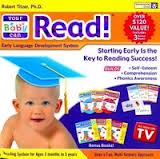Most parents have seen the commercial –three-year olds reading Harry Potter, one-year olds cruising through books. If you’re like me, you probably felt a little guilty that you hadn’t availed yourself of the learning miracle promised by “Your Baby Can Read” for your kids. “Your Baby Can Read!” is a $200 set of DVDs, pop-up books and flash cards meant to teach infants to read. Well readers, feel guilty no longer. Indeed, enjoy if you want a moment of schadenfreude, because according to the FTC babies can’t in fact read.
On August 28, 2012, the FTC announced that it had filed a complaint against the company that sold the program (Your Baby Can, LLC), Robert Titzer, Ph.D, the creator of the program, and Hugh Penton, Jr., the company’s former president and CEO. The FTC complaint charges the defendants with making false and deceptive claims in ads and product packaging that the program could teach infants and toddlers to read and that scientific studies proved the claims. According to the FTC, the defendants failed to provide competent and reliable scientific evidence that babies can learn to read using the program or that children at age three or four can learn to read books such as Charlotte’s Web or Harry Potter. The complaint also charges company founder Dr. Titzer, who the company touted as an expert in infant research, with making deceptive expert endorsements.
To settle the case, Penton and the company both agreed to cease from any further use of the term “Your Baby Can Read.” The settlement order against also prohibits Penton and the company from misrepresenting the benefits, performance, or efficacy of any product or service for teaching reading or speech, or enhancing language ability, cognitive ability, school performance, or brain development. They also are barred under the settlement from misrepresenting that scientific support exists for such assertions. The settlement imposes a $185 million judgment, which equals the company’s gross sales. Upon the company’s payment of $500,000, the remainder of the judgment is suspended based on the company’s failing financial condition. The company apparently has shut down operations. Dr. Titzer apparently will fight the allegations.
A couple of things we can “read” from this case. First, the FTC found that the ads regarding the program’s efficacy required competent and reliable scientific evidence, thus equating the claims with a health or safety claim. Second, the FTC required the settling defendants to cease using the term “Your Baby Can Read” in any way. This is a fairly draconian remedy that the FTC does not often use. Third, the case continues the FTC’s efforts to vigorously police advertising involving children.
If Dr. Titzer does litigate the case, it will be interesting to see how he tries to prove that babies can read. If he succeeds, I suppose I’ll have to go back to feeling guilty about the fact that my kids got left behind.
